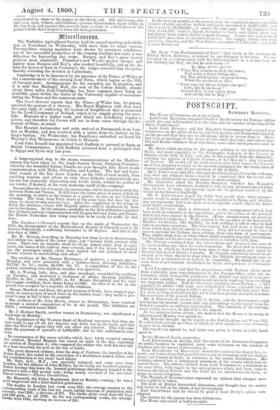POSTSCRIPT.
SATURDAY MORNING.
The House of Commons sat at six o'clock.
Lord JOHN Massrats inquired whether the Secretary for Foreign Affairs could give any information as to the time and the manner of meeting of the Savoy Conferences ? Lord JOHN RUSSELL said her Majesty's Government had assented to a Conference on the affairs of Savoy, but that Austria and Russia had objected, on the ground that they saw no advantage likely to accrue from it. There had been no meetings of the Great Powers since that time, and unless Aus- tria and Russia withdrew their objections, some other arrangements must be made.
Mr. Rica called attention to the papers relating to the disturbances in Syria, and more especially to the telegraphic despatch of the Consul at Smyrna of the 11th of July, and also to the despatch from the Admiralty, covering the reports of Captain Poynter, of her Majesty's ship Exmouth off Beyrout. He would ask the noble lord to state what course the Govern- ment was prepared to adopt in the present emergency for the vindication of wrongs committed and the preservation of life in Syria. Sir J. FERGUSSON said that although the Christians had been the sufferers, they were not without blame—indeed he considered that the recent out- break was attributable in a main degree to their conduct. Mr. GRIFFITH. asked the Foreign Secretary whether her Majesty's Government have absolutely declined to join in any measures for prevent- ing, by force of arms, any descent upon the Neapolitan territory by the troops under General Garibaldi. Mr. S. FITZGERALD hoped the noble lord would state what arrange- ments would be made with regard to the expedition to Syria, and whether any arrangements had been made as to the precise course which the Euro- pean forces would adopt. Lord J. RUSSELL made a statement as to the arrangements which had been made in reference to the expedition, and to the nature of the protocol which had been signed by the Powers. (These arrangements are given in the published telegrams.) With respect to the question of the honourable Member for Devizes (Mr. Griffith), he had nothing to add to what he had said on previous occasions. The Government had laid down a broad line from which they did not intend to depart. They did not intend by force of arms to prevent the Italians from settling their own form of government. They might adopt wise, or what others might consider, impolitic resolutions, but England and France were determined not to interfere with them.
Mr. BRIGHT considered that the intervention now proposed was more to be excused than any other he could remember. He proceeded to denounce the wars in which we had been from time to time engaged, and which he thought had proved barren of results. He thought something should be ar- ranged as to what should be done when the Turkish Government came to an end, for to maintain it he held to be impossible. He should like to see some form of government established for Syria independent of Constanti- nople.
Lord PAL3IERSTON said that his acquaintance with Turkish affairs arose from a tolerably long superintendence of the Foreign Office, while the in- formation of the honourable gentleman (Mr. Bright) was derived from per- sons in the country, whose prejudices and interests rendered them anything but impartial judges. Nobody who knew anything about Turkey, a sd who regarded the matter with large and enlightened views, expected that the Turkish Empire was going to fall to pieces. If they would only leave Tur- key alone perhaps it would not fall, for it had been greatly strengthened since the acccession of the present Sultan. Mr. S. HERBERT, in answer to Sir F. Smith, said the Government could not during the present session take any proceedings on the report from the Select Committee on military organization. The attention of the Govern- ment would, however, be directed to the subject.
At ten minutes before eleven, the motion that the House at its rising do adjourn until Monday was agreed to.
Mr. 3fassny brought up the report on the Fortifications and Works Bill. It called forth several speeches, in which no new arguments were advanced, no new facts elicited.
The report was agreed to, and leave was given to bring in a bill based upon it.
In the House of Lords, yesterday,
Lord BROUGH.A3I, on moving that the report of the Commons Committee on public business be reprinted, made some strictures on the conduct of business and the means of forwarding it. Lord STRATFORD DE REDCLIFFE moved for copies of the despatches, re- ports, and instructions that passed between our Government and our Ambas- sador and Consuls in Syria, in reference to the recent disturbances. His lordship entered into a lengthened statement of the events which had oc- curred there. His address elicited from Lord WODEHOVSE a statement to the same effect, with regard to the arrangements which had been come to between the Great Powers and the Porte for an interference in Syria, as given in recent telegrams. The Marquis of CLANRICA.RDE expressed an opinion that stronger mea- sures ought to be taken.
The Earl of DERBY deprecated discussion, and thought that the matter, had better be left in the hands of the Government.
Earl GRANVILLE said he should be glad if Lord Derby's advice were idopted.
The motion for the papers was then withdrawn. The House adjourned at half past eight.


























 Previous page
Previous page